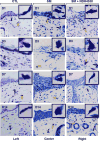Sulfur mustard induced mast cell degranulation in mouse skin is inhibited by a novel anti-inflammatory and anticholinergic bifunctional prodrug
- PMID: 29127031
- PMCID: PMC5938161
- DOI: 10.1016/j.toxlet.2017.11.005
Sulfur mustard induced mast cell degranulation in mouse skin is inhibited by a novel anti-inflammatory and anticholinergic bifunctional prodrug
Abstract
Sulfur mustard (SM, bis(2-chloroethyl sulfide) is a potent vesicating agent known to cause skin inflammation, necrosis and blistering. Evidence suggests that inflammatory cells and mediators that they generate are important in the pathogenic responses to SM. In the present studies we investigated the role of mast cells in SM-induced skin injury using a murine vapor cup exposure model. Mast cells, identified by toluidine blue staining, were localized in the dermis, adjacent to dermal appendages and at the dermal/epidermal junction. In control mice, 48-61% of mast cells were degranulated. SM exposure (1.4g/m3 in air for 6min) resulted in increased numbers of degranulated mast cells 1-14days post-exposure. Treatment of mice topically with an indomethacin choline bioisostere containing prodrug linked by an aromatic ester-carbonate that targets cyclooxygenases (COX) enzymes and acetylcholinesterase (1% in an ointment) 1-14days after SM reduced skin inflammation and injury and enhanced tissue repair. This was associated with a decrease in mast cell degranulation from 90% to 49% 1-3days post SM, and from 84% to 44% 7-14days post SM. These data suggest that reduced inflammation and injury in response to the bifunctional indomethacin prodrug may be due, at least in part, to abrogating mast cell degranulation. The use of inhibitors of mast cell degranulation may be an effective strategy for mitigating skin injury induced by SM.
Keywords: Acetylcholinesterase; Countermeasures; Epidermis; Mast cells; Sulfur mustard.
Copyright © 2017 Elsevier B.V. All rights reserved.
Figures



References
-
- Amitai G, et al. Bifunctional compounds eliciting anti-inflammatory and anti-cholinesterase activity as potential treatment of nerve and blister chemical agents poisoning. J Appl Toxicol. 2006;26(1):81–87. - PubMed
-
- Cardamone C, et al. Mast cells as effector cells of innate immunity and regulators of adaptive immunity. Immunol Lett. 2016;178:10–14. - PubMed
-
- Conti P, et al. Mast cell, pro-inflammatory and anti-inflammatory: Jekyll and Hyde, the story continues. J Biol Regul Homeost Agents. 2017;31(2):263–267. - PubMed
MeSH terms
Substances
Grants and funding
LinkOut - more resources
Full Text Sources
Other Literature Sources
Medical
Miscellaneous

